
The annual Pastoral Synaxis of the clergy of the Archdiocese of Thyatira and Great Britain, was successfully held, presided by His Eminence Archbishop Gregory.
The Gathering was organized by the Archdiocese , with the involvement and cooperation of the Hieratic Committee Association “St. Athanasios”, in which president is the active Fr. Anthimos Papandreou.

In the three-day Gathering, 14 – 16 May 2013, the High Priests of the holy Archdiocese, Theofil. Bishop of Kianeon and Chrysostomos and Theofil. Bishop of Tropeou, Athanasios, most Priests of the Archdiocese , as well as some Elders & Deacons and other brothers, attended.
The Gathering was hosted by the church communities of St. Peter & Paul , and the Birth of the Virgin, in Bristol and the church community of St. Andrew of Weston-Super-Mare, of the West of England. In the first (Greek Orthodox) Community of Bristol the delegates were welcomed with cordiality and generosity by the Sanctuary Head Father George Nicolaou and the laity Archons. In the second – but – equally historical community of Bristol (of Russian liturgical tradition), the participants had the opportunity to be guided by hierarchical Head Archim. Kyrillo Jenner, and a group of laity Archons. The participants were also very warmly welcomed in the Community of Weston-Super-Mare, with a similar spirit of Orthodox hospitality, by the hierarchical Head Archimandrite Tychicus Vryonis and the dedicated laity Archons.

The works of the Gathering began in the Church of St. Peter & Paul’s in Bristol with Prayer and Chanting. Then the message of Holiness Ecumenical Patriarch Bartholomeos, was read through which His Holiness conveyed his blessing to the Gathering and the conference members.
After that there was the welcome of the Reverent of the Greek Community of St Peter and Paul of Bristol Father George Nicolaou, who for many years ministers this Community, and a very interesting and highly emotive overview of the Community’s history from the founder Mrs Aglaia Hill.

Later, His Eminence Archbishop Gregorios greeted the participants cordially and with fatherly love and among others:
a). He said that this was the 25th Hieratic Gathering,
b). Thanked the clergy and laity of the hosting Communities,
c). Presented the innovation of this year’s gathering with the operation of workshops,
d). He recalled the current economic crisis and advised the communities to make a wise management of their money, and finally,
e). He strongly emphasized that the Province of Thyatira is an extension of the holy Ecumenical Patriarchate.
The Reverent of the Church of St. Peter & Paul ‘s in Bristol Father George, in his welcome speech, said among others, the following:

“Christ has Risen! We welcome you to the Greek Orthodox Community of Bristol! It is an honor for our community to host the Hieratic Assembly. With the grace of the Risen Christ and with the blessing of His Eminence Archbishop, we hope that the works of the Congregation will be for the benefit of all of us and for all our brothers who will participate.
In the beautiful and historical city of Bristol the Greek element arrived in 1942 during the Second World War. The church-going was held in Cardiff on Christmas and at Easter. With Mrs Aglaia Hill’s – founding member of the Community – efforts, the first Divine Liturgy is held in 1947 in an Anglican Church. As the community was growing, Liturgies were held every two or three months, when the priests came from London.

In 1951 the Greek Community of Bristol is officially founded with the name Hellenic Association of the West of England, with its own Statute . In between, there were constant efforts by the dear departed Bishop of Apamia, Iakovos to find a permanent church.
Thus, in June 1958 it is granted by rent the church in which we are and which soon acquired an Orthodox form and character and was renamed Temple of Saints Apostles Peter and Paul. The inauguration took place on 29 September 1963 by the deputy of the Archdiocesan Throne of Thyatira and Great Britain, Bishop of Apamia, Iakovo Virvo. First priest was appointed Archimandrite Irineos Athanasiadis (now Archbishop of Crete). The church originally served throughout the West of England.
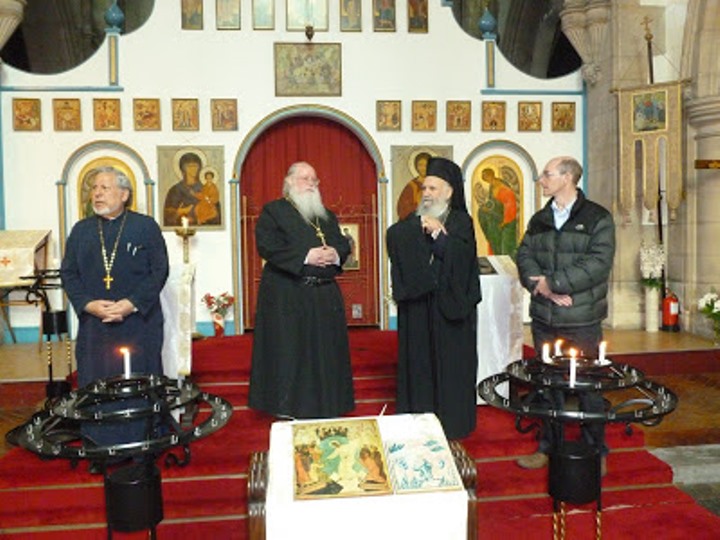
In 1964 the residence of the priest was purchased and in 1965 the Ladies Auxiliary Society “St Tabitha” was established. In 1978, after the efforts of the dear departed Archbishop Athenagoras the Temple was purchased by the Greek Orthodox Community and was registered in the records as a charitable organization. Since 1991, the church is authorized to do civil marriages (Decision No. 41490).
Meanwhile, in 1958 the Greek School began operating with temporary housing until 1982 when it acquired its own building next to the church. Since 1994 it is a registered as an examination centre for GCSE, AS & A level examinations, in the Greek language.
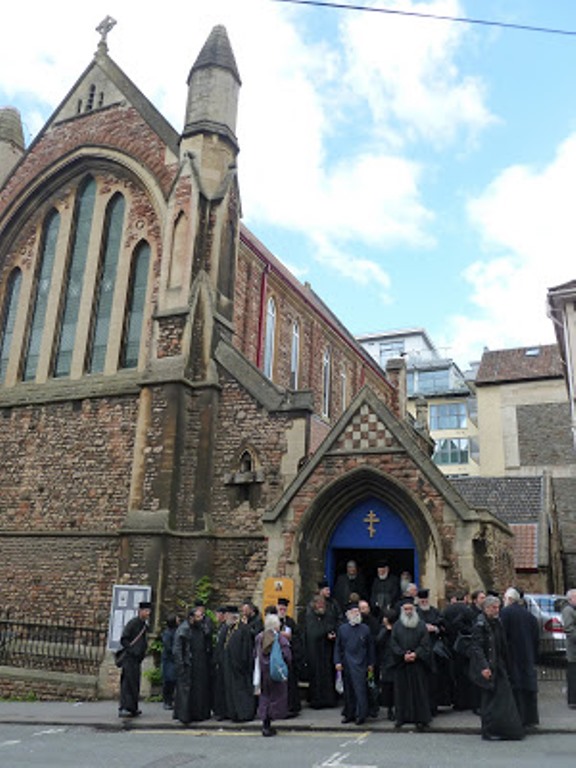
With generous donations of its members, the Community today has a real estate that helps to cover some of its financial needs. After determined efforts of its younger members, the Community also, succeeded to acquire in 2000 its own Community Centre in the precinct of the Church, where all its activities take place. The Community Centre is granted on rent to expatriates and other minorities of the region and that way it contributes to the financial support of the Community, but it also strengthens the relations and the mutual understanding between residents of the region.
Nowadays, the Greek Community of Bristol and its outskirts, has 150 registered families and 500 students. We believe that the families are increasing because of the new economic migrants mainly from Greece, and every Sunday we see new faces at the church.
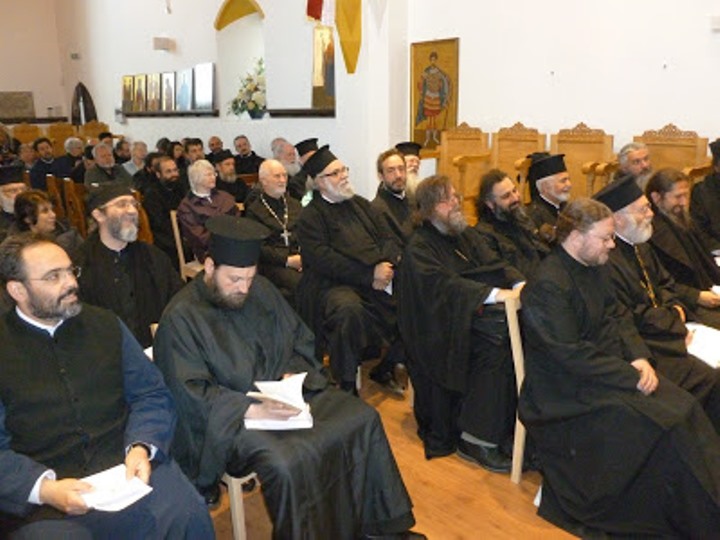
According to the statistics of the Community from 1946 until today we had 350 marriages, 1,271 baptisms and 204 funerals.
Your Eminence, we would like to thank you for choosing our Community for the organization of this year’s Gathering. We would also like to thank the President of the Hieratic Association, Reverent Anthimos Papandreou for his contribution to the organization of the Assembly. Finally, I would personally like to thank everyone who worked on this Assembly: the Community Council, the Commissioners, the Ladies of the Filoptochos and the parishioners.”
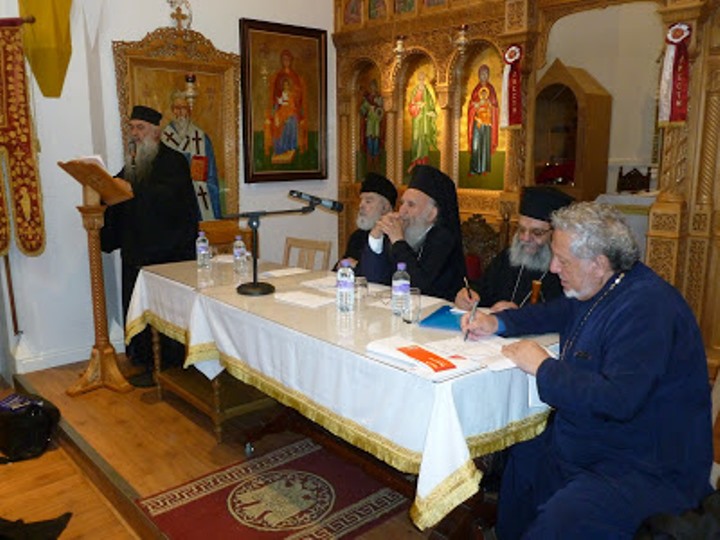
The Hieratic Conference was continued in the beautiful and traditional English resort of Weston-Super- Mare. There, the participants enjoyed the sea breeze, saw the perpetual play of the sun with the clouds of Alviona and heard the secret roar of the sea waves invading in the city’s bay at sunset.
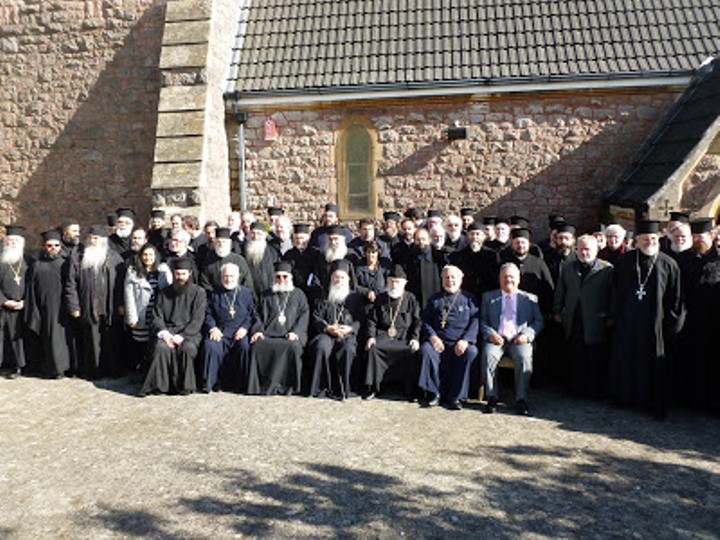
The Archimandrite Zacharias, of the Holy Stavropigiaki and Patriarchical Monastery of St. John the Baptist in Essex, gave an excellent speech on the Divine Liturgy, and enraptured everyone with the high theological meanings that he presented. The experienced speaker said among others the following:
“The Divine Liturgy mentions the sacrifice of Christ and teaches the His humble love and His desire for our salvation … The Divine Liturgy connects us with Christ and introduces us to the eternal plan of God for humanity. It causes within us our intercession for the whole world …
Exchanging our lives with the life of Christ, we exchange time with eternity. The exchange is naturally uneven. The disparity lies in the fact that life is given to us as a loan. When we offer it to Christ he gives us his own …
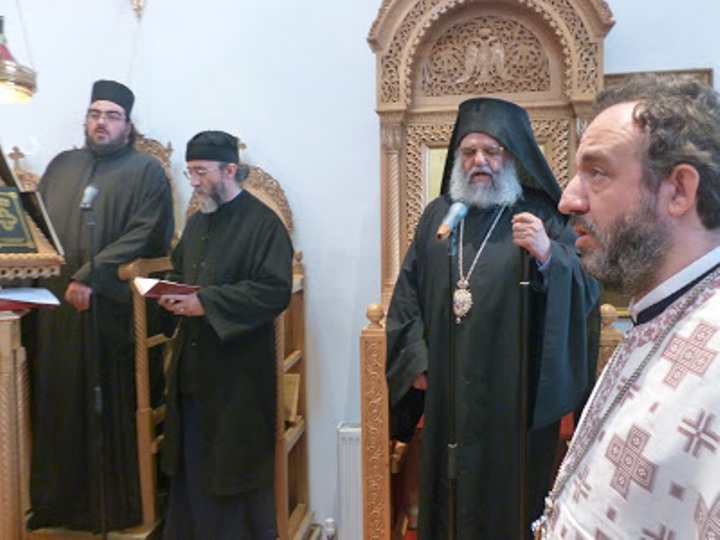
The Divine Liturgy encourages us to cultivate consciousness. In the liturgical congregation we constitute the body of the Church, the body of the Christ. Frankness or arrogance have no place in the Divine Liturgy. Our goal is to humble ourselves …
The Divine Liturgy is the place in our prophetic gift. Each one of the faithful gives the best they can. The Liturgy is a time of great spiritual enrichment …
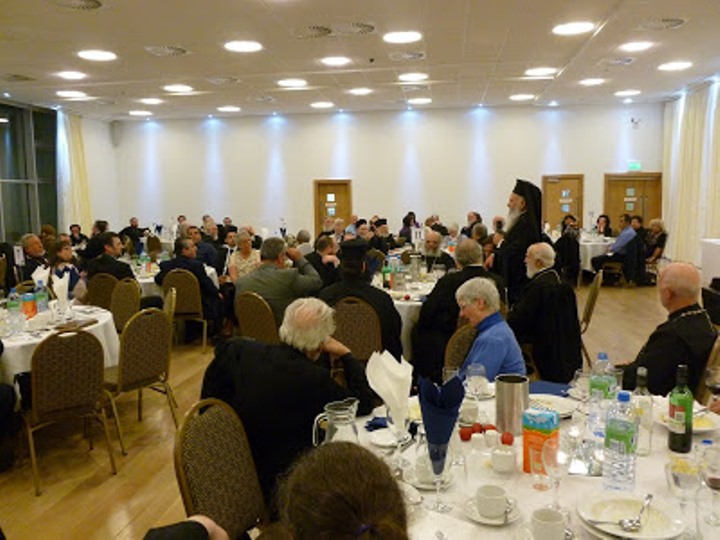
While we are doing the Divine Liturgy on earth and man is exchanging his life with the imperishable life of Jesus Christ, the hope will not disappear!
During this Assembly, with an inspired initiative of His Eminence Archbishop Gregory, for the first time there were four workshops. In these workshops, several important issues that affect the interest of the Priests of Thyatira were elaborated.
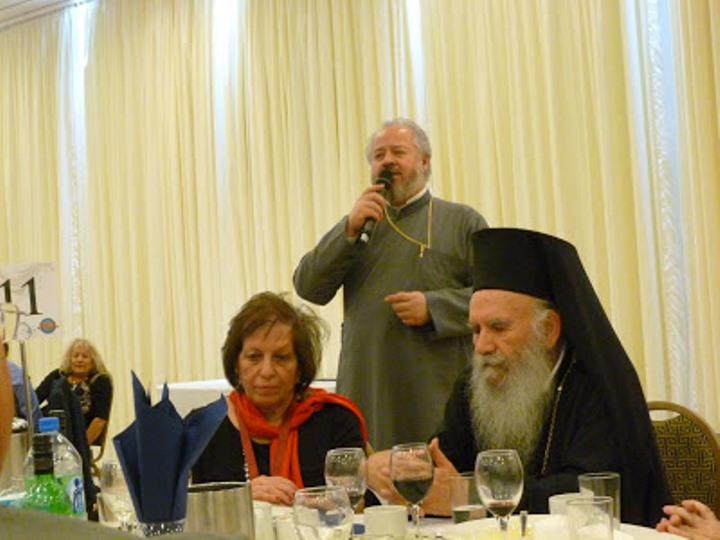
The workshop topics were as follows:
The issues discussed were Marriage and Family, Education, Christian Orthodox Catechism, Divine Worship, the bereaved and the cremation.
The relation between the Clergy and the Committees, as well as financial issues, were processed.
The discussion revolved around the conjugal relations, health and modern media, homosexuality, internet and pornography, pedophilia, divorce, psychological problems, etc.
The Pan-Orthodox relations, the relations with other Christians and other religions, and the relations with non-believers were discussed.
After completion of the discussions in the individual workshops, their representatives presented to the plenary of the Assembly, the views and recommendations that were submitted to them.

In the closing session of the Assembly, the participants were informed on the establishment of the new Greek Orthodox School of Secondary Education ‘Apostle Andreas’ in North London. This will begin its operation in September 2013, and have already enrolled 130 students.
The participants were also informed of the concerted efforts that are made in order to complete the legal establishment of the Common Fund, in which the Communities of the Archdiocese contribute financially.
It was also noted that there were fund raising events for the whole expatriate community, held recently at the initiative of the Archdiocese of Thyatira and Great Britain, to relief our brethren in need of help because of the financial problems in Greece and Cyprus.
Finally, the Byzantine musical sounds met with the colours of the English spring and the Easter Greek smells, to offer to the participants a clean intellectual savour, which will accompany them for a whole year until the next meeting.
from: Fr. Anastasios D. Salapatas (Romfea.gr)
I think that the historical research has not yet sufficiently enlightened the immeasurable contribution of the Church in developing communities abroad. However, from the scattered elements that the studier can have into consideration, he would recognize in this contribution, one of the major forces that promote the defence of our motherland and create new ideals. Because the Church is the sacred hoop that keeps us close to God, to Motherland and to Family and it fills our lives, the life that is full of love for Motherland, Religion and Family.
So, the emigrant Hellenism, with Christian perseverance, suffers the hopes of a free Cyprus, and the realistic existence of Greece. All Greeks, whenever they migrate under several devastating conditions, eg like the present, try to preserve the treasures of the traditions and the preservation of the national soul by vigilantly guarding the Orthodox Christianity.
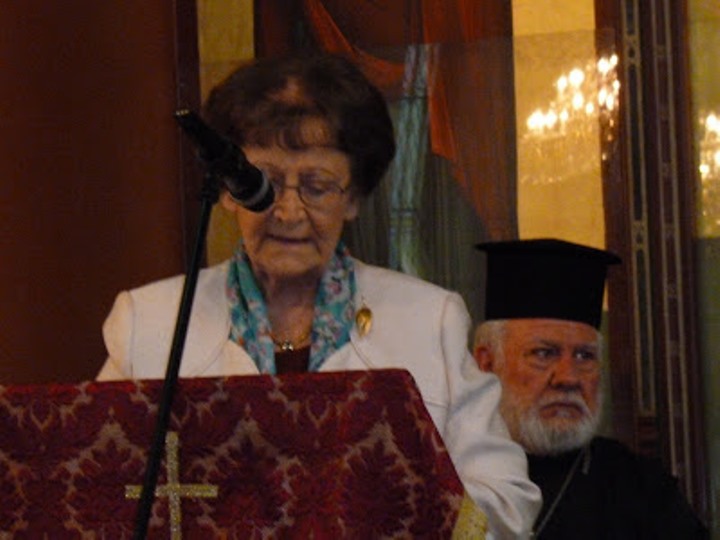
The Greek emigrant and the Cypriot Greek go to church not only for their souls, but to find the roots that go along with the religion of every Resurrection and of course with the coexistence with their fellow compatriots . That is why the Church is the sacred hoop when abroad.
In churches, we traditionally see somewhere above the Pantocrator and below images of our Saints. These are not just figures, but they are there to elevate us and to strengthen us spiritually so as with our prayer to bring us close to the Spiritual and Invisible divine world of the earlier large Orthodox Christians, whose names we have and celebrate. Thus we feel the unconditional love of our God. At this point I will refer to a poem by Kavafis titled ‘ The Church ‘ where he says:
“I love the church, its banners, its silver objects and its candlesticks. The vigil lights, the pictures, the Sanctuary. When I go there in the church of the Greeks with the scent of incense, the chanting and harmony, the imperial presence of the priests shining in their ornamental vestments, their serious rhythms and movements, my thoughts turn to the glories of our Nation, and to the glorious history of the Byzantine heritage and tradition.”
So I love too, the Easter Liturgies, the Sacred Sufferings of the perfect love of Christ for the people. I love the bright and colourful candles and chandeliers, the decorated Epitaph, the red eggs, the Easter dishes, and all our glorious traditions. The Artoklasia, the memorials, the Fanouropita and the fasting olive pies. All this and much more are for us Greeks the encouragement and the deep love for Motherland. Yes, the church is our home, our family, our home, our Hellenism, and our soul close to God.
I came here too, on June 16, 1946 just 18 years old, leaving sunny Athens and gazing with tearful eyes the Parthenon from the taxi. Then I felt like I was going to my own funeral. I was leaving my adorable parents and the aching and heavy injured country from the invasion of the Nazis and the terrible civil war. I was already married to Alfi who waited for me at the airport to put me into the military plane and to see me leave alone, while he assured the broken hearts of my family members that he would take care of me. This way he tried to console them by staying close to them, while I was leaving alone and sad. Alfeos, which was baptized Orthodox in 1963 by the highly respected Archimandrite Irineos Vasileiadis and later Bishop of Pataron, stayed behind with them.
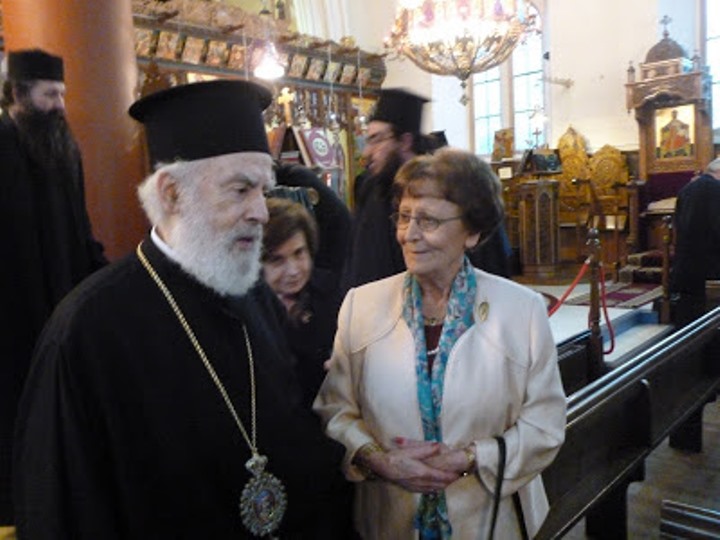
The first thing, I did arriving here after a month’s trip, was to buy with the coupons a waterproof coat.
Arriving here, I felt like a blind man found in a completely foreign environment searching, weeping, detecting and stumbling everywhere.
In January 1947 with the help of the wonderful parents of Alfeos, I met with the dear departed – Christian lit – English priest LW HERNEMAN MAXWELL JONSTON, then vicar of the Anglican church of St Barnabas Knowle in Bristol. There we attended the divine liturgy in English soon after the birth of our daughter Galini, after the advice of the then Archimandrite Iakovos Virvou from Agia Sophia in London, which then was the only church in London.
Then, in March there was the Baptism of our daughter Galini, inside the house, because of the terrible weather, by the Archimandrite Iakovo Virvou. They brought the baptismal font from the church of St. Barnabas. The godfather was found the last minute, he was known by Fr Iakovos Virvou. His name was Michael Chatzikiriakou. So a complete stranger was the godfather of our child. Then the church of Cardiff was without a priest. All that was necessary for the baptism I had bought them with coupons. I bought the oil from a pharmacy. It was in a small bottle that they used as an ear medicine.
Shortly after, with letters to the military authorities, embassies and the Anglo-Greek Union of Greeks in London, I received a card with nine names and addresses of Greek Women, who had been married to British soldiers. We found only seven of them.
Using a church hall of St. Barnabas, and with the assistance of a new College director, I started weekly gatherings of Greek women, and we were doing needlework. This was a much desired way to communicate freely in our language and to face the lack of our country and our religion.
At Easter I prepared our poor celebration, with only a few sandwiches and some meat paste, as everything were bought with coupons. So we sang our national anthem and the ‘Christ has Risen’. We had three large red paper eggs with chocolates inside, that my parents had sent. But I promised them that we would soon have a priest from London to operate normally and that we would have communion at last. You cannot imagine the thrill when they listened to my speech. Guests were Mr. Dave Klifornt, an English representative of the Greek Consulate in Bristol, Mr. Kanon Johnstone with Mrs. Johnstone and our husbands.
The same year, a little later we had the first Divine Liturgy in the church of St. Barnabas, which was committed by the then Archimandrite Dionysios Psiachas. Of course I did what I could, acting as the cantor and neokoros. In our second Divine Liturgy in 1948, I became a godmother. This was repeated several times, as if by magic our numbers increase. The only fee of the priest was to cover the cost of the ticket from London, who was then somewhere a pound and ten shillings.
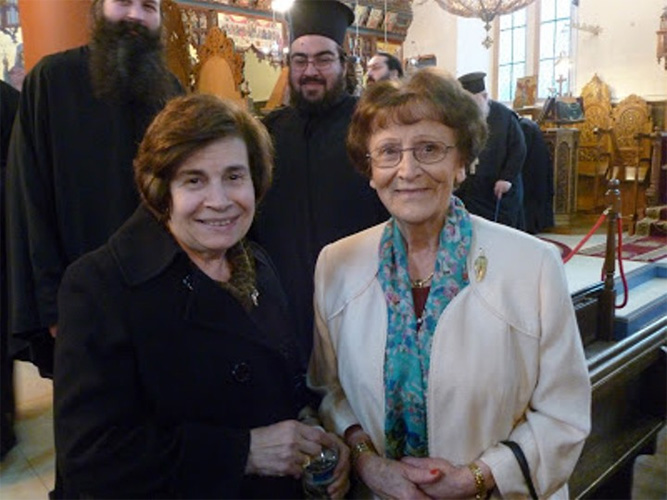
In the third Divine Liturgy, I organized in 1948, suddenly I heard someone chanting in Byzantine style. It was Mr. Panagiotis Michaelides, later father Luke. Our Divine Liturgies continued to take place in the church of St. Barnabas, until 1952, when due to the new comings of Greek Cypriots, who managed to escape the British held Cyprus and seek something better to survive, left their homeland and their relatives, at the invitation of some of their own here.
So our number started to increase, then passing number fifty. But we had to find a church more central and accessible to everyone. So we started to come to the church of Saint James on the Horsefair, in the city center, which they granted us when we needed for weddings and christenings. Thus, from 1952 to 1958 we used that church. The first liturgy was committed by Archimandrite Emilianos Timiadis. At that time the Baptism of our son Richard – Nicholas took place and godfather was the son of Mrs. Mary James.
The dear departed Canon Johnstone died while serving in the Bristol Cathedral in 1970. His death was mourned across the Greek Community, here in our church.
Alongside we held national and religious feast and various events in the church hall of Saint Mary Redcliff. Th events were with Greek dances and music. There the newcomer women from Cyprus highlighted the treasure of our traditions and dishes, despite the economic difficulties.
In 1951 the first regular meeting of the members, was held and there was voting, and the establishment of a Committee named Hellenic Association of the West of England with our own statute, where men are the pioneers of the Church Committee, which means men were Presidents and women Vice Presidents, I was repeatedly Vice President. Everything was done in the presence of the Hieratic Head of the Church of Cardiff, Leontios Chatzikostas.
It is noticeable that there are many migration waves by Cypriots. This increases the need of those who come. Most work in their relatives shops that sell fish and chips. But the need assists the church in numbers, but also the church helps its migrant children. On the national feasts and on celebrations, our number increase and we are now 150.
In our traditional celebrations, along with a few English friends, we present the dances with our Greek costumes and theatrical sketches, as the tradition of Cyprus wedding. The money we collect to use them for food and to pay the transportation costs of individual priests who came from London for the Liturgies.
In 1955 we begin efforts to find our own church. Our national events decrease even though with these our morale was exalted, but we have several weddings and baptisms and a more regular priest, doing priestly studies in a College near Bristol. Ii is the then Archimandrite Panteleimon Rodopoulos who serves the Community until 1957.
The 1958 it is the Cretan the then Archimandrite Irineos Athanasiadis who does all the litourgies, now Archbishop of Crete. At the General Meeting, he announces the new Statute of the Church of London, where only men have the right to vote for the Church Community Committee. Women can deal with minor charitable events and help as always in everything. The dynamic will and the efforts of many of us, but especially of His Eminence Irineos, of the dear departed Bishop Iakovos of Apamia and of Metropolitan Athenagoras, bring pleasant results. So, in 1959 we are officially granted a church then named Saint Simon with a minimal rent of £12 per year, by the English Church Authorities of Bristol.
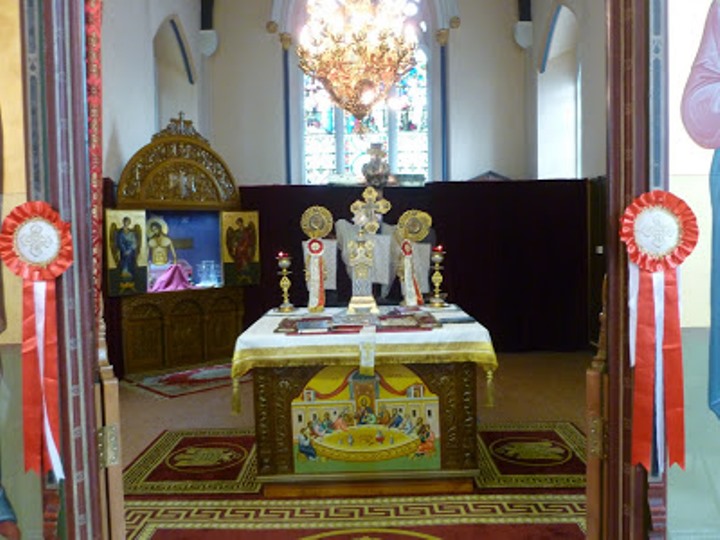
Here I must mention that this church was used for three -plus years as a warehouse by the scouts and you cannot imagine the situation of a vast space with cement and stone slabs, colorless walls and without heating, with hundreds of pigeons that filled the room with dirt below the bell tower and the surroundings. All needed too much money and continuous daily labors to be somewhat tolerable.
My eyes water watching the contract of the first large images, which says, “total payment 245 pounds, 35 pounds each.” Certainly they weren’t Byzantine style, but the shapes of Saints filled with warmth the scruffy space of the wooden empty temple of this old church, as it was then.
Today these images still decorate the church, sited there by father George, on the painted now walls, among other new icons, of the holy temple, in a Byzantine style, and many other decorations. All were done with the countless cares of tireless, active and patient priest father George. His wonderful artist and dignified wife lady Christalla and their praiseworthy children Nicholas, Andrew and their families, support and continuously care and help the sacred work of their father and are active members of our community.
Father George Nicolaou undertook the sacred duties of the Community of Bristol in September 1979 , taking on countless projects, correcting and supplementing. Eventually, installing trust and confidence of permanency acted so the church is now completely ours!
The above text is part of the speech given by Mrs. Aglaia Hill, on May 14, 2013 in the Church of Holy Apostles Peter and Paul, in Bristol, of the West of England, within works of the Hieratic Conference of the of Thyatira and Great Britain.